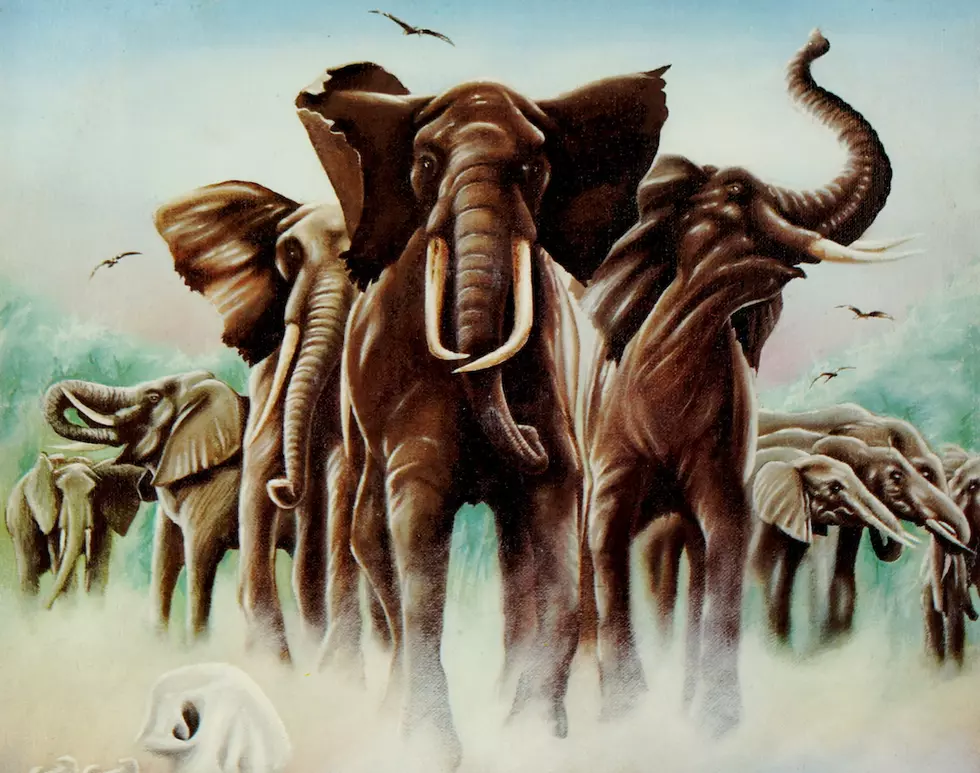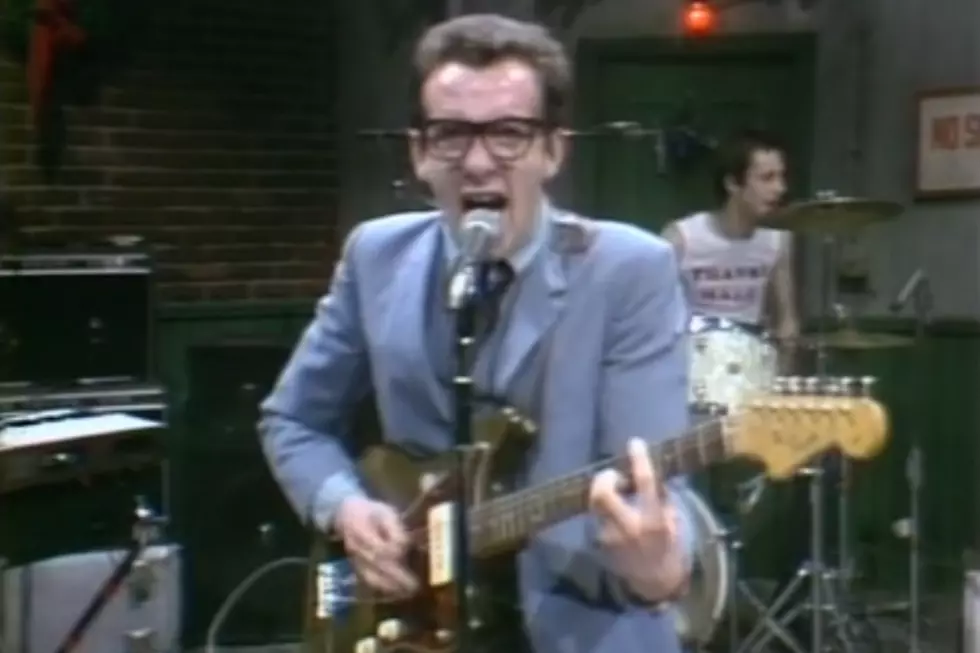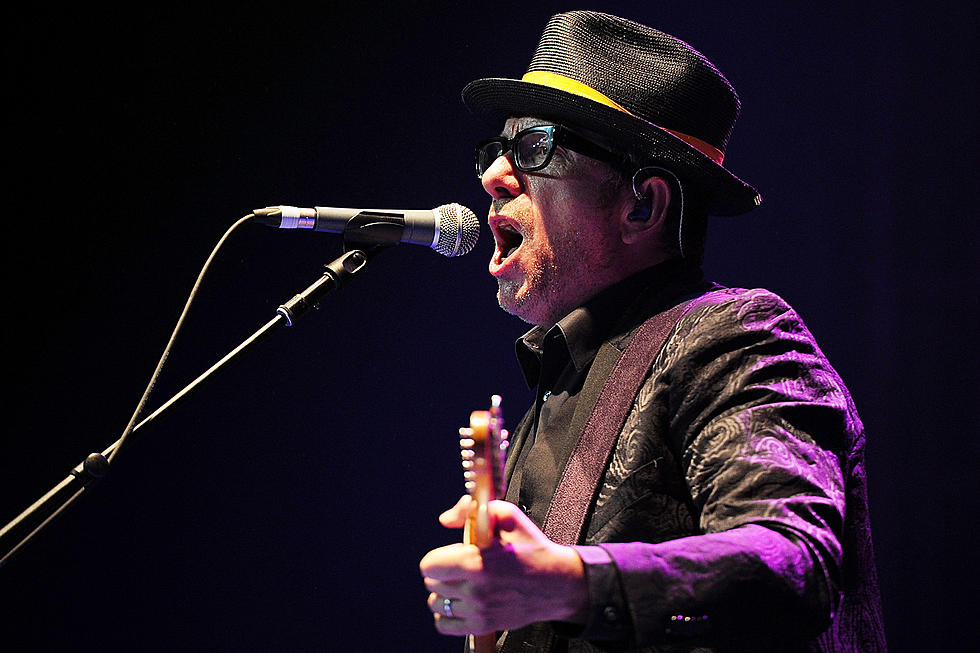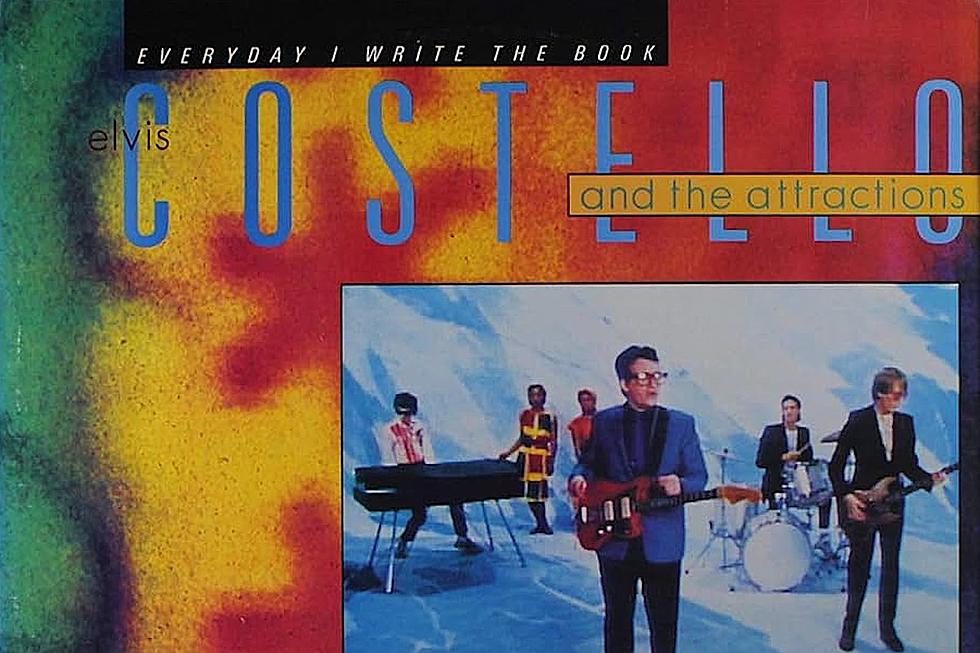
When Elvis Costello Closed Out the ’80s With ‘Spike’
Elvis Costello once described Spike as basically "a comedy record." Released on Feb. 14, 1989, this 12th studio album was "born of the idea that things are, have become, so absurd that laughter is the only response," he told NME. "Some people have enough and reach for a hand grenade, I put it into my songs. ... It's that moment when you don't know whether to laugh or kick the TV in."
Costello's career had had its share of absurd moments during the years leading up to Spike. He'd experienced deepening rifts that led to the disbandment of his longtime cohorts the Attractions, and taken up the somewhat peculiar practice of crediting himself under several different names on the same album. Following the release of his previous LP, 1986's Blood & Chocolate, fans didn't know what his real identity was anymore: Was he still Elvis? Was he Declan Patrick Aloysius MacManus – or was he Napoleon Dynamite?
That schizophrenic approach helped inform the sessions for Spike, which took place in four far-flung locations (Los Angeles, New Orleans, Dublin and London) with multiple personnel groups. Joining him at various points were an assortment of famous names, including Paul McCartney, Allen Toussaint, the Dirty Dozen Brass Band, Roger McGuinn, Benmont Tench and Mitchell Froom.
"I didn't really think of it as an all-star cast, I'll say that off the bat," Costello stressed during an interview with On the Street. "There's obviously a couple of names there that everyone's going to talk about when the record comes out, and their parts are essential to the whole, but there are people who did more work on the record – and I think that should be acknowledged."
McCartney, Costello's most attention-getting collaborator, raised eyebrows for a couple of reasons: First, because the former Beatles legend was one of the biggest rock stars on the planet. Second, because many onlookers felt McCartney's middle-of-the-road '80s output made him an odd fit for the younger, more restless Costello. It's hard to understand now, but at the time, McCartney was considered washed up.
"I was ... concerned that people might misunderstand my using the traditional forms like the Dirty Dozen Brass Band from New Orleans and the traditional Irish instruments, and might think it was like a musical travelogue. Because I can justify every note on the record. I know exactly why those sounds are there. I think they really illuminate those songs," Costello argued to On the Street. "I haven't had time to consider what anyone's going to think about it. I know some people have very bad preconceptions about Paul McCartney, but I'm involved to the extent that I've written a bunch of songs with him, as well. I know he's a really good bass player, so I'm not too bothered about what anyone thinks about him playing on my record. I don't think it reflects at all on my perception of myself as a songwriter."
Listen to Elvis Costello Perform 'Veronica'
Costello also told NME that he knew more of McCartney's music "than cynical people might expect. When we first went to America and it was Foreigner and Journey and all that layered, sugary, anthemic shit, Wings' stuff like 'With a Little Luck' was like manna from heaven." That said, "a lot of his post-Beatles work is not to my taste. We had to accommodate the difference."
Their songwriting sessions produced a dozen songs, two of which ("Pads, Paws & Claws" and "Veronica") ended up on Spike. The latter track, a deceptively sunny number about an elderly woman sliding into dementia, served as the record's first single – and gave Costello a rather unlikely Top 20 hit.
"I wanted to write a song about this old person sitting there and appearing to be completely gone, as we say, but really coming and going and sometimes being completely lucid – but not making it a sentimental song," Costello told the BBC. "I wanted it to be sort of defiant and happy, as if it was about a very young girl who was just starting out her life."
Costello frequently cautioned critics against reading autobiographical overtones into his first-person lyrics, but he admitted that "Veronica" had genuine personal significance. "I really took a lot of it from when I was talking with my grandmother, when I went to visit her during the last few years of her life," he added. "It's like a love song in a way for her, but written as if it's about a young girl. The pop music thing bears that up. People will hear the song and maybe say, 'Oh yeah, it's about this young girl Veronica,' and then maybe listen a little bit more. I'm not making any big point; it's just a little bit of hope and a love song from me."
"Veronica" reflected an increasingly direct lyrical approach for Costello, who'd become known for his erudite lyrics. He pulled fewer punches on Spike, particularly on political numbers like the anti-capital punishment anthem "Let Him Dangle" or "Tramp the Dirt Down," which found him fantasizing about stomping on then-Prime Minister Margaret Thatcher's grave.
"I don't sit down like Sting or somebody and go, with furrowed brow, 'Oh, I dealt with the disintegration of relationships on my last manuscript, now I'm revisiting it again,'" Costello told NME. "It just isn't that conscious." As he said to the BBC, "I think over the last four years, I've written much simpler, easier to understand songs, and I've left behind some of the trickier use of words that didn't necessarily always say more."
Listen to Elvis Costello Perform 'God's Comic'
Sonically, Spike presented more of a varied patchwork than fans had grown accustomed to from Costello. Previous albums tended to find him working in a specific stylistic vein, while Spike was all over the map. It was an approach he later admitted was an outgrowth of "trying to upset or subvert the expectation of the listener." Spike seemed designed to provoke the listener in the best possible way, right down to the album's colorful cover and evocative title.
"The Beloved Entertainer was the original title for the record," explained Costello in a 1989 BBC interview. "I had this image of the beloved entertainer in captivity, as we see him now hung up on the wall. That's kind of what the record companies do now; they go out and shoot their artists and hang them up like a trophy in the boardroom."
Perhaps ironically, the success of Spike made Costello a pretty attractive trophy for the execs at Warner Bros., the new label home where he signed after running out a long contract with Columbia.
The album's gold sales would prove to be the exception rather than the rule for Costello's tenure there, but Spike served as the perfect beginning for a new era in his career: He ended up recording with everyone from Toussaint to Burt Bacharach, writing a song cycle for string quartet, and reuniting with the Attractions, among all manner of other excursions.
But in the end, no matter who he was recording with or what he was calling himself, Elvis was still Elvis. That was something he half-winkingly chalked up to the old maxim that style is defined by limitations. "I'm a really clumsy guitar player, but I have a certain thing that is unique – because I'm so clumsy, really," Costello told the BBC. "If you have very limited technique, you find exactly the notes you want, and they're the ones that are important."
See Elvis Costello and Others in the Top 100 Albums of the '90s
More From Ultimate Classic Rock









